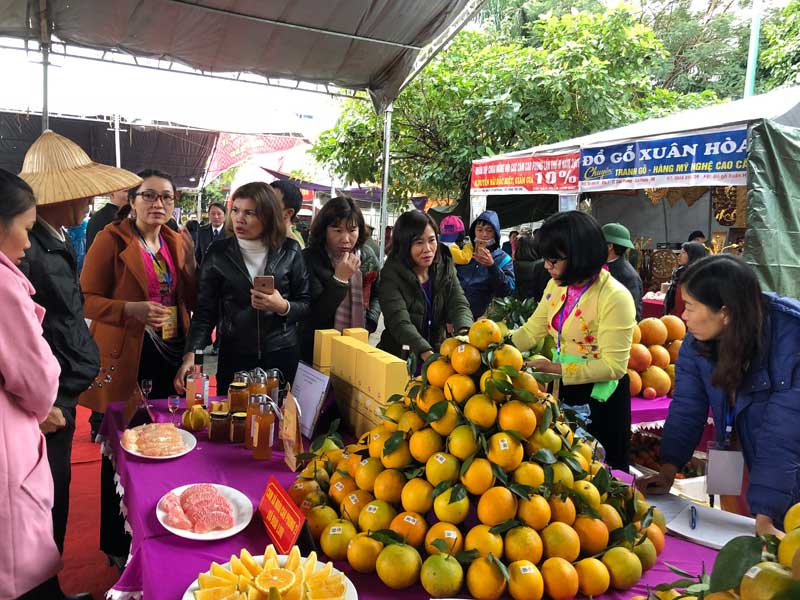
(HBO) – A citrus fruit festival and agricultural fair took place in mid-December in the northern province of Hoa Binh as part of the activities to promote local citrus fruits.
In recent
years, the area of citrus fruits in the province has increased to 9,700
hectares in 2018 from 1,976 hectares in 2013, yielding 123,000 tonnes.
The fruits are mainly grown in nine out of the
11 districts and city, including oranges in Cao Phong, Lac Thuy, Kim Boi and
Lac Son districts, and grapefruits in Tan Lac and Yen Thuy districts. In Cao
Phong alone, the area of citrus fruits covers over 3,000 hectares, including
1,300 ha ready for harvest with an estimated output of 36,000 tonnes, up 3,000
tonnes against 2017. Lac Thuy district has 1,045 hectares of these fruits,
including 400 hectares ready for harvest, yielding over 8,000 tonnes.

Cao Phong
oranges promoted at the citrus fruit festival and agricultural fair win trust
of customers thanks to its clear label of origin.
To protect the brand of citrus fruits, the local
agriculture and rural development sector has applied a number of measures in
recent years, including the control of the quality of varieties. Unscheduled and
periodical inspections are carried out annually to prevent low-quality
agricultural supplies, especially fake fertiliser and unsafe seedlings from
entering the local market.
The provincial plantation and plant protection division
said it has conducted inspections over 500 establishments trading agricultural
supplies on the use of pesticides, production procedures, and breeding sales.
They found no violation.
Since 2015, the province has successfully built
geographical indicators for Cao Phong, Lac Thuy orange and Tan Lac red-flesh
grapefruit. To protect the brand of the fruits, local gardeners have applied
science technology into production, meeting requirements on fruit hygiene and
safety. In Cao Phong district, about 800 hectares of oranges were certified
with Vietnamese Good Agricultural Practices (VietGAP), labelled with trace of
origin and packaged to prevent counterfeit products. Meanwhile, in Tan Lac
district, some 52 hectares of red-flesh grapefruits received VietGAP
certification./.
Dao Village’s honey – a product certified with a 3-star OCOP (One Commune One Product) rating by Thong Nhat Agricultural Cooperative in Dao Village (Hoa Binh City) – is highly regarded by consumers for its quality, richness, and variety in packaging. The distinctively sweet taste of Dao Village’s honey leaves a lasting impression on anyone who has tried it.
In alignment with Project No. 07-DA/TU, issued by the Hoa Binh provincial Party Committee on November 1, 2021, Lac Thuy district has actively promoted investment and supported the sustainable development of its industrial and handicraft sectors during the 2021–2025 period. Alongside this, the district has remained committed to preserving and revitalising traditional craft villages.
Located in the northern part of Lac Thuy district, with a temperate climate and fertile soil, Phu Thanh commune has great potential and advantages in growing tea. The long-standing experience, combined with strict adherence to organic farming practices in the tea gardens, ensures that the dried tea products from Phu Thanh and Lac Thuy as a whole are sold out immediately upon production, providing a stable and prosperous life for the local people.
Amid efforts to streamline the administrative apparatus, Hoa Binh province has intensified measures to address challenges in land clearance, resettlement support, and infrastructure investment, aiming to speed up the progress of key projects.
Hoa Binh province has posted an unprecedented economic growth rate of 12.76% in the first quarter of 2025, marking its highest quarterly performance to date and positioning it as the second fastest-growing locality in the country, trailing only Bac Giang province.
Under current regulations, products in the One Commune – One Product (OCOP) programme that are rated three stars or higher must undergo re-evaluation every three months. However, in reality, some of these products fail to consistently meet the required standards, raising concerns about the sustainability of their OCOP certification. This underscores the urgent need for producers to enhance product quality and gradually develop their OCOP products into strong, marketable brands.



